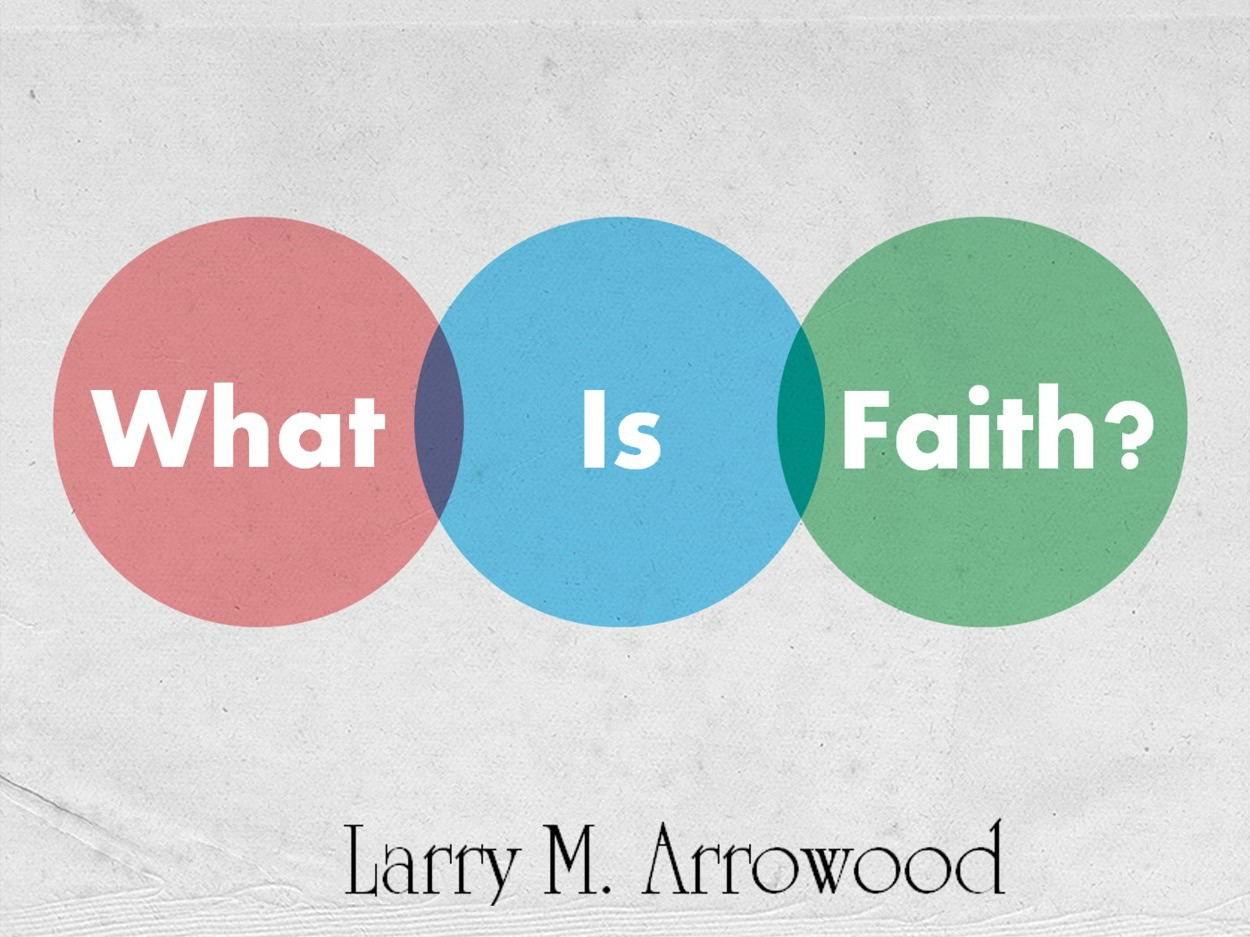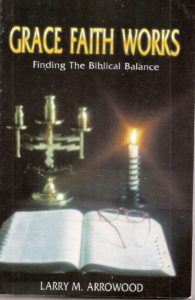By Larry M. Arrowood
The New Webster’s Dictionary defines faith as “complete acceptance of a truth that cannot be proven.” The writer of Hebrews defines faith as “the substance of things hoped for, the evidence of things not seen” [Hebrews 11:1]. But it is not enough to define faith: we need to experience faith.
It is one thing to know what faith is, but it is entirely something else to have faith. As an example, we know fear by both definition and experience. There is little, if any, emotion or result from our definition of fear; however, when we experience fear, there is a host of emotions and responses that we experience. In fact, we can experience fear without having known its definition prior to our experiencing fear.
The same is true with many terms; for instance, love, pain, hunger, and loneliness. Likewise, faith is a term we can define without having experienced it, and experience it without a good definition for it. Yet, too many know only what faith is; notwithstanding, they do not possess faith.
To know or define faith is insufficient. Faith is useless unless experienced; therefore, to experience faith is to activate the definition of faith . . . complete acceptance of a truth which cannot be proven. Each morning when I awaken, I believe the sun will shine (even though sometimes hidden by the clouds), and that the day will last for a full twenty-four hours. Because I believe this, I plan my day accordingly; however, I have no proof that this is so. Though I have experienced this many times, there is no way of proving that this day will be like all others, I simply act upon my faith. Yes, scientists have proven the “what” (a twenty-four hour period of 365 days), but they cannot prove the “whether”: whether or not the twenty-four hour time period will continue. This is where we operate by faith or succumb to fear.
Yet, faith does not have to include God. The atheist can believe that tomorrow will come; of course his faith is in history for since the recording of time the sun has always risen. So, here is where the secular and the religious part. The secular may have faith in history, that is, they believe in the future because of the past. As a Christian we have faith in God, that is, we believe in the future because we believe God controls the future. Can I prove this? No. That is why it is called faith.
In surveying the definition of faith as given by Webster, there are three points that we should consider.
1) Complete Acceptance
“…let him ask in faith, nothing wavering. For he that wavereth is like a wave of the sea driven with the wind and tossed. For let not that man think that he shall receive anything of the Lord. But when he asks he must believe and not doubt. . .” [James 1:6-7] NIV.
The Israelites failed to receive God’s promises because they failed to completely accept by faith that the God who had promised would fulfill His promises. From this example we learn that to partially believe God is inadequate. Though Israel had experienced God’s deliverance through His mighty acts, these initial experiences did not guarantee them Canaan; rather, they had to persevere through faith, believing in God every day in every situation.
Note the scriptural illustration of the failure of Israel to completely accept God’s promises; they were not allowed to enter into Canaan because of unbelief.
“For we are made partakers of Christ, if we hold the beginning of our confidence stedfast unto the end; While it is said, To day if ye will hear his voice, harden not your hearts, as in the provocation. For some, when they had heard, did provoke: howbeit not all that came out of Egypt by Moses. But with whom was he grieved forty years? was it not with them that had sinned, whose carcases fell in the wilderness? And to whom sware he that they should not enter into his rest, but to them that believed not? So we see that they could not enter in because of unbelief’ [Hebrews 3:14-19].
“Let us therefore fear, lest, a promise being left us of entering into his rest, any of you should seem to come short of it. For unto us was the gospel preached, as well as unto them: but the word preached did not profit them, not being mixed with faith in them that heard it” [Hebrews 4:1-2].
2) Acceptance of Truth
This is not an acceptance of everything. Faith is not a get rich quick scheme, such as “Send me one thousand dollars by faith and God will double your money.” To the contrary faith is believing in truth: God and His promises are truth. Our faith needs to have a reference point in the Word of God. This will keep us from erring in our requests to God.
Anything apart from God and His Word may be challenged as to whether or not it is truth.
“Jesus saith unto him, I am the way, the truth, and the life: no man cometh unto the Father,
but by me” [John 14:6].
“Sanctify them through thy truth: thy word is truth” [John 17:17].
Thus, our faith must be predicated upon God’s Word. James warned us that we are not even to make requests that would dishonor God by being contrary to God’s Word.
“Ye ask, and receive not, because ye ask amiss, that ye may consume it upon your lusts” [James 4:3].
Yet, when we ask in faith those things which are pleasing to God, we can expect to receive them.
“Verily, verily, I say unto you, He that believeth on me, the works that I do shall he do also; and greater works than these shall he do; because I go unto my Father. And whatsoever ye shall ask in my name, that will I do, that the Father may be glorified in the Son. If ye shall ask any thing in my name, I will do it” [John 14:12-14].
3) Truth That Cannot Be Proven
Our faith is in a God that we cannot see, although we see evidence of His presence and experience His presence within our lives (this experience needs to remain within the bounds of scripture). We believe in a book of which no known original copy exists: the oldest known copy of scripture was written in the fourth century A.D. Thus, true faith trusts in truth that cannot be proven, however, this kind of faith brings Biblical results that cause us to trust God more. We all begin with “a measure of faith” which grows as we exercise that measure of faith.
Now let us look at the scriptural definition of faith: “the substance of things hoped for, the evidence of things not seen” [Hebrews 11:1]. The word itself (faith) is intangible, for it cannot be detected by the senses (we can’t taste it, touch it, smell it, see it, nor hear it); however, when we experience faith — when faith gets in our hearts — faith becomes something that is tangible: it becomes definite, perceivable, and objective in experience.
*Substance: the matter, stuff, material of which a thing is made’
Therefore, faith is the tangible existence of our hopes; our hopes go from an intangible desire (wish) to a present existence. Hope without faith is in the future tense; however, when faith enters, the hope becomes present tense: faith is the substance of which our hopes are made. Matthew Henry wrote, faith “. . .is a firm persuasion and expectation that God will perform all that He has promised to us in Christ; and this persuasion is so strong that it gives the soul a kind of possession and present fruition of those things, gives them a subsistence in the soul. . .” 2
When I was younger, I always hoped for certain things at Christmas time. For weeks and even months I would talk about my hopes. Finally, the Christmas tree would go up and gift wrapped boxes would be placed under the tree. The gift wrapped boxes were the “substance” of my hopes. Could I see the gifts? No, but I knew they were there!
Such is our faith. A hope becomes substance when faith enters our hearts. We enter into another realm. Our persuasion that we will receive our hope becomes so strong that our soul begins to count the days left before we can open our gift. That’s why we praise God before the miracle happens. Faith produces praise. Remember, Israel was rebuked by the Lord because they lacked the element of faith. They were often praising God on the wrong side of their miracles: after the miracle rather than before.
*Evidence: anything that provides material or information on which a conclusion or proof may be based
Faith is that which provides material or information from which you and I form a conclusion though we cannot visibly see the answer. The gift wrapped box is the evidence that the gift is present; however, the actual gift is yet unseen by the natural eye. Matthew Henry continues, “Faith demonstrates to the eye of the mind the reality of those things that cannot be discerned by the eye of the body. . .it is designed to serve the believer instead of sight, and to be to the soul all that the senses are to the body.” 3 Paul wrote, “For we walk by faith, not by sight” [II Corinthians 5:7].
But faith is not blind; rather, it is seeing with a different set of eyes than the natural. If you can see it or prove it with the natural senses, then it is not faith; it is faith when it can only be seen through the eye of the spirit.
Faith does not come through carnal thinking.
“So then faith cometh by hearing, and hearing by the word of God” [Romans 10:17].
Faith is therefore a spiritual state. It is a state of complete trust in God: anything is possible with God (Note Matthew 19:26, Mark 9:14-27). Faith is a spiritual state in between your wishes (even needs) and the reality of a miracle. We do not go from our wishes to a miracle; rather, we go from wishes, to faith, to a miracle. It is in this spiritual state (faith) that the thing is as good as done; for in this state we are in total confidence of God’s ability; therefore, if my request is in God’s will, it shall be done.
Any part of our Christian walk that does not have this attitude lacks faith, and “. . .without faith it is impossible to please Him. . .” [Hebrews 11:6].
The above article, “What is Faith,” is written by Larry M. Arrowood. The article was excerpted from the seventh chapter of Arrowood’s book Grace Faith Works: Finding the Biblical Balance.
The material is most likely copyrighted and should not be reprinted under any other name or author. However, this material may be freely used for personal study or research purposes.





1 thought on “What Is Faith (Entire Article)”
Comments are closed.